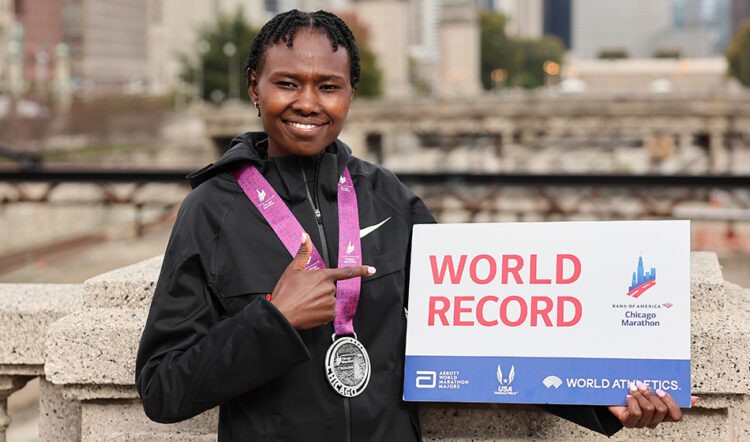As the Kenyan becomes the first woman to break 2:10, the running world is left wondering if the performance was down to her undoubted talent, hi-tech super shoes, modern energy drinks or something else
It is almost five years to the day since Ruth Chepngetich survived the carnage on the Corniche to become world marathon champion on a sweltering night in Doha.
In a desperate attempt to avoid the worst of the day’s heat, the race started at midnight on the Qatari capital city’s famous promenade. Despite the bizarre scheduling, the temperature was still 32.7C with 73.3% humidity as runners set off.
Reporting on the action with my colleague Euan Crumley, we were dripping in sweat as we merely stood roadside watching the action. Not surprisingly, the athletes struggled in the oppressive conditions with 28 of the 63 starters dropping out.
It was a gruelling spectacle and after 2hr 32min 42sec, though, Chepnegetich breezed through the finish line to take gold.
When asked about the conditions, she replied: “It was not bad for me!”
Ruth Chepngetich (Mark Shearman)
On Sunday (Oct 13) the diminutive Kenyan once again defied the laws of nature as she stormed to a world record of 2:09:56 in Chicago.
Tigist Assefa’s world record of 2:11:53 from just over a year earlier in Berlin was unfathomable enough. But Chepngetich sliced almost two minutes off the Ethiopian’s time.
In her wake, runner-up Sutume Asefa Kebede finished more than seven and a half minutes behind. Paula Radcliffe, who clocked a long-standing world record of 2:15:25 in 2003, would have finished five and a half minutes (or more than a mile) behind.
Not only did Chepngetich run faster than Eamonn Martin when he clocked 2:10:50 to win the London Marathon in 1993, but she is now quicker than Brits such as as Chris Thompson, Marc Scott and Ben Connor, among others. In fact, only 22 British men have beaten Chepngetich’s time.
Historically, she is more than three minutes quicker than double Olympic men’s marathon champion Abebe Bikila and more than 13 minutes faster than Emil Zatopek. The great women’s marathon pioneer Grete Waitz, meanwhile, had a best of 2:24:54.
When it comes to Olympic finals, Chepngetich’s time in Chicago is quicker than every men’s race from the advent of the modern Olympics right up to 2004 with just one exception. Waldemar Cierpinski won the 1976 Olympic title in a quicker time, but only by a solitary second with 2:09:55.

Ruth Chepng’etich (Getty)
CLICK HERE to Read the Full Original Article at AW…

